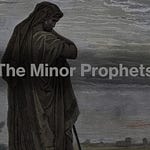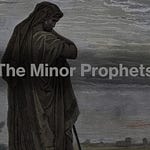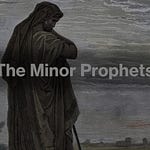Indiana Wesleyan University was where I was first introduced to the many factional divides in Christianity. What we often call denominations (and yes, non-denominational is also a kind of denomination) represent these divides rather well. So there I was, sitting in the lecture during my freshman year of college, taking notes, and trying to learn whatever I could from my Theology 101 course.
One day, the professor started the lesson by discussing different views of soteriology (how God works to save people) and adjudicating between them. At one point I put down my pen, leaned back in my seat, and thought to myself, “That position he is ripping to shreds right now is what I think I believe.” That was the start of a long journey.
Somewhere in between Ligonier’s articles and Calvin’s commentaries—which are available freely online—my suspicions grew to certainties. Scripture teaches that God works monergistically to save sinners from their sins.
Monergism is a doctrine that says regeneration is exclusively the work of the Holy Spirit, apart from the cooperation of human agency. It is contrasted with Synergism, which holds that God requires human agency alongside his activity to enable salvation.
Creation and Fall
Every good story has a beginning, and this holds true with the story of mankind. God created the world good from the start, with humanity as the crown jewel of his glory in creation. It is not long (hardly one page-turn in most Bibles) before humanity screws up their perfect utopia by failing to obey God’s voice. Eve listens to the serpent, then Adam listens to Eve, and the whole situation leads to death and sin permeating the world as we know it.
Even as I type that previous description, it is hard for us to think of a world without sin’s corruption. Any conversation around a perfectly created order is riddled with suspicion. That is how pervasive sin and sin’s effects are. It gets worse though. Humanity doesn’t only suffer from sin but actually embraces sin. Humanity enjoys sinning.
Redemption
So the story of the Bible is one long epic, showing how God is determined to save his people even though nobody seems to want to be saved. Sure, everyone wants to be saved in a certain sense, as long as that salvation does not come with the price tag of obedience and living differently than how one currently wants to live. So unfolds the drama of the God determined to save a people bent on not being saved.
Weaved into the fabric of this saga is a conundrum, and one that has divided Christians over the centuries. How exactly does God work in the act of saving humanity? Does God offer salvation and we choose it of our own free will? Or does God need to enliven our free will before we can choose to receive him as Lord? The Biblical text is helpful here, for Paul explains how God turns our affections to want him.
Ephesians 2:1–9
1 And you were dead in the trespasses and sins 2 in which you once walked, following the course of this world, following the prince of the power of the air, the spirit that is now at work in the sons of disobedience—3 among whom we all once lived in the passions of our flesh, carrying out the desires of the body and the mind, and were by nature children of wrath, like the rest of mankind. 4 But God, being rich in mercy, because of the great love with which he loved us, 5 even when we were dead in our trespasses, made us alive together with Christ—by grace you have been saved—6 and raised us up with him and seated us with him in the heavenly places in Christ Jesus, 7 so that in the coming ages he might show the immeasurable riches of his grace in kindness toward us in Christ Jesus. 8 For by grace you have been saved through faith. And this is not your own doing; it is the gift of God, 9 not a result of works, so that no one may boast.
Allow me to hone in on one portion of this text. Paul says, “It is the gift of God.” What is the it to which Paul refers? Being saved by grace through faith (vv. 5, 8) is the it given to us by God. The whole package of salvation is given as a gift by God to humanity. If any part of that package was not from God, then it could be grounds for human boasting.
None of these ideas are original to me. While TULIP and other ways of conveying this scheme may be helpful, I can content myself with the framework Paul has provided, and in which Augustine masterfully brought to light the central claim of this text in Ephesians.
Learning from Augustine
Augustine was historically engaged in a long debate with a heretic known as Pelagius over the freedom of the human will to respond to God in salvation. While different in certain respects from the debate between Luther and Erasmus that took place a millennium later, the core concerns were the same. Does God save persons by his sovereign decree, or do persons respond to God’s offer of salvation of their own freedom?
Augustine says it would be impossible for God to simply offer us salvation because we are all rebels against God, and unable to respond to his free gift of grace. He uses a fourfold distinction to clarify how the human will is bound in sin after the fall and not truly free.
Before the fall, in perfect creation, the human will was posse peccare, posse non peccare. No, I did not just have a stroke. That phrase is Latin for, “able to sin, able not to sin.” Adam and Eve were free to do whatever they wanted, and their desires were unbound by sin. They could choose to eat of the tree or not eat of the tree. However, after they ate of the tree, the human will was altered.
As we see after the fall, humanity is non posse non peccare, or “not able not to sin.” This is what Paul means when he says, “And you were dead in the trespasses and sins.” Before being made new in Christ, the Ephesian church was unable to respond to God on its own. Their wills were unable to resist sin. And this is true of those who are not Christians currently. This means that there are none who are ‘seekers’ of God and none who desire him themselves. This is where the monergistic part of salvation comes into play. If we take seriously the effects of the fall on the human will, that those who sin are slaves to sin, then the only way out is by God acting apart from human consent. Augustine rejects a synergistic view of salvation for this very reason. If God acted synergistically, he would be waiting on us for all eternity to get back to him.
Yet, since Christ is active in the world by his Holy Spirit, he provides for us new desires that are able to respond to God’s saving work. This is called the new birth, or as Paul says, “even when we were dead in our trespasses, made us alive together with Christ—by grace you have been saved—and raised us up with him and seated us with him in the heavenly places in Christ Jesus.” We are resurrected by Jesus’ power as a new creation. Our deadness is contrasted with his life-giving power. This happens prior to us wanting to be saved by God, for it is “when we were dead” that God made us alive.
This resurrection is mysterious. Our old desires to sin are still present. Augustine describes this as the human will being posse non peccare, “able not to sin.” It is the current status for all who have faith in Christ. Any desire to repent from sin and trust in Christ for salvation is an alien desire, given to us by God’s grace. If you are a Christian, that feeling of desiring to know God and his word more deeply is a work of God in your heart. Sorry you don’t get credit for that, but God certainly does.
We remain in this state of being able to resist sin, and free to choose righteousness or wickedness until our glorification one day. At that time our wills will be changed into their final state of non posse peccare, “unable to sin.” While I can’t imagine how this could be possible one day, it is exactly what we Christians long for. To be rid of sin and to enjoy all the benefits of our union with Christ.
One Objection
I may have ruffled many feathers already, so let me deal with one objection I commonly hear to the above understanding of salvation. If we can’t choose to respond to God apart from God forcing us to love him, then there is no real human freedom involved. We are just robots who react mechanically to God’s actions. While this is an extreme straw man of the reformed position, it is also the most common reason I hear for rejecting monergistic salvation.
But, if human freedom depended upon our ability to either choose God or choose sin at all points in time, then would humanity be free in glory? If, in glory, we will be prevented from falling into sin again, by God’s grace, and we need to be able to choose sin in order to be free, does it not follow that freedom eventually goes away?
The reformed view is that we are indeed free in glory, but not free to sin! Freedom is not having an uninfluenced choice between multiple options, but doing what one wants to do. If God causes us to want to obey him, then we are still entirely free, even in glory. We are free to obey God, not free to sin.
Doxology
Paul concludes his doctrinal explanation in Ephesians in a way that is fitting for us to close as well.
“Now to him who is able to do far more abundantly than all that we ask or think, according to the power at work within us, to him be glory in the church and in Christ Jesus throughout all generations, forever and ever. Amen.” (Ephesians 3:20–21).
We should not bristle at these truths but praise God for his activity in the world to save sinners who were bent on sending themselves to hell in a handbasket. While we were in shackles and bent on self-harm, God intervened in our plans and chose to save us for his glory. For that, his name is worthy to be praised.
Discussion Questions
What are other Biblical texts that might be helpful to look out for in the conversation of God’s salvation?
What are passages that seem irreconcilable with monergistic salvation? Can you reconcile those passages, or do you still have questions?
How are humans really free if we cannot choose God in a fallen world?
How does this impact evangelism, discipleship, and church ministry?
How does this impact prayer?












